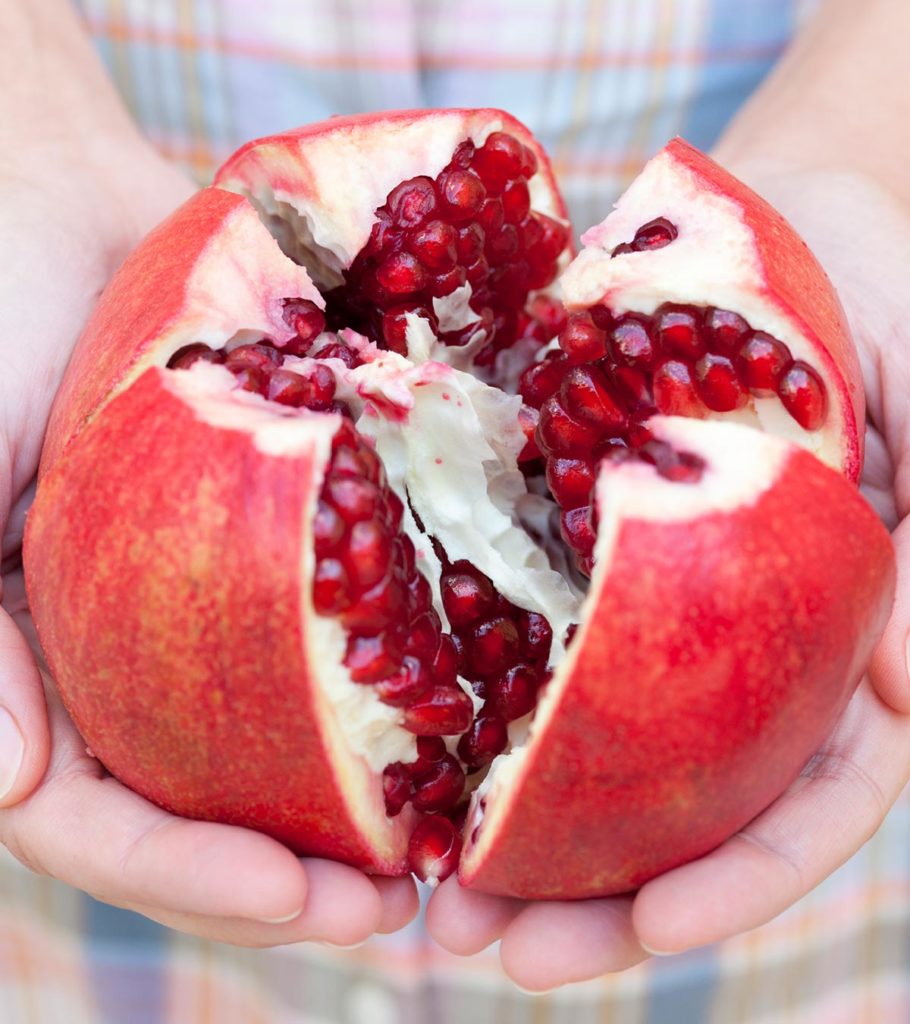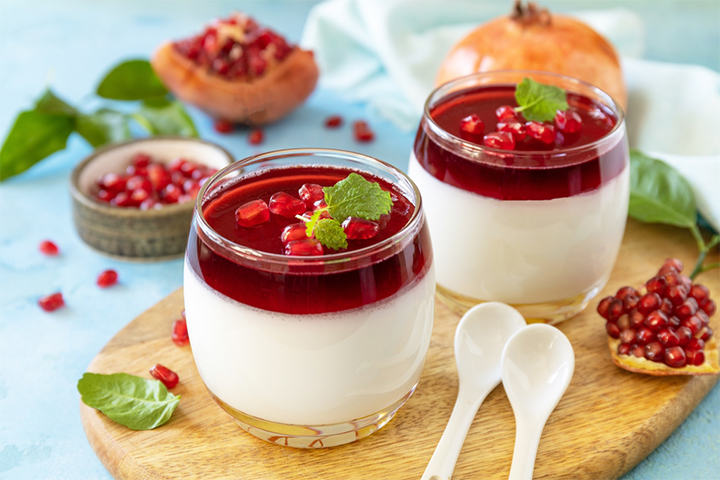Many women may have low hemoglobin counts while breastfeeding. If you are among them, eating fruits such as pomegranates while breastfeeding will be beneficial. Apart from improving your hemoglobin levels, this fruit is known to prevent some oral and dental conditions. Perhaps that is why the fruit is considered a superfood in several cultures.
Read this post to explore whether it is safe to consume pomegranates while breastfeeding and some of its potential health benefits. This article also provides some important details on the usefulness and possible side effects of consuming this nutritious fruit.
What Is A Pomegranate?
A pomegranate is a flavorful, colorful, and nutritious fruit with spiny skin and distinctive crown to its red arilsiXThe fleshy edible portion covering the seed of a fruit. Pomegranate derives its name from its Middle French name ‘pomme garnete’ which means ‘seeded apple’. The fruit is also popular as Chinese apple and contains high amounts of nutrients. So, as a nursing mom, you should be keen on including it in your diet to meet your daily nutrition needs (1).
Is It Safe To Eat Pomegranates While Breastfeeding?
Yes! It is perfectly safe to drink pomegranate juice while you breastfeed your baby. However, you should avoid a high intake of pomegranates while nursing. Consult your doctor before you raise the intake of pomegranate in your diet. The doctor will analyze your condition and recommend the appropriate intake of the fruit to ensure the safety of your newborn.
Health Benefits Of Eating Pomegranate While Breastfeeding
Pomegranate is a juicy fruit that can provide hydration. Besides, it contains several nutrients and antioxidants that benefit the nursing mother and her breastfeeding baby. Here are some benefits of including pomegranate in your nursing diet.
1. Cures stomach disorders
Pomegranate juice could treat stomach disorders, such as cholera and dysentery. Drinking fresh pomegranate juice relieves digestive problems while nursing a newborn (1).
2. Dental care
Another benefit of consuming pomegranate or pomegranate juice is that it helps minimize hazardous effects of dental plaque and prevents several oral ailments. Pomegranate possesses antiviral and antibacterial properties that ensure your dental hygiene and care (2).
3. Prevents anemia
Pomegranate fruit and its juice help enhance blood flow in the body. The fruit’s high iron content can help minimize the symptoms of anemia in the postpartum period and can effectively treat fatigue, dizziness, hearing loss, and exhaustion (3).
4. Treats osteoarthritis
Pomegranate treats the hardening and thickening of arterial walls, joints, and cartilages. This property makes pomegranate an effective treatment for osteoarthritisiXA form of arthritis that only impacts the joints causing inflammation and painand atherosclerosisiXHardening of the arteries due to accumulation of fats, cholesterol, and other substanceseffectively. Also, eating pomegranate prevents the production of enzymes that sever connective tissues in your body.
5. Potassium-rich
Pomegranate is an excellent source of potassium, so it prevents kidney problems and infections while you are nursing your newborn.
6. Rich source of vitamin C and fiber
Pomegranate seeds contain high amounts of vitamin C, so much so that it helps fulfill your 40% daily recommended intake of the crucial nutrient essential to maintaining a robust immune system. Also, high levels of fiber in the fruit regulate blood pressure and satiate your hunger. If you find it difficult to chew and eat pomegranate seeds, you can place them as toppings in your oatmeal or yogurt and eat them.
Pomegranate seeds contain high amounts of vitamin C so much so that it helps fulfills your 40% daily recommended intake of the crucial nutrient. Also, high levels of fiber in the fruit regulate blood pressure and satiate your hunger. If you find it difficult to chew and eat pomegranate seeds, you can place them as toppings in your oatmeal or yogurt and eat.
Besides several nutrients mentioned above, pomegranate also contains a good amount of sugar. Several studies examined the amount of sugar found in pomegranate juice. Results of one such study are depicted in the graphical representation below.
Major sugar components of the pomegranate juice
Source: Primary metabolites, Anthocyanins, and Hydrolyzable Tannins in the Pomegranate Fruit; Frontiers in Plant Science
The findings reveal that glucose and fructose are main sugars in the pomegranate juice, whereas maltose and sucrose are found in relatively small amounts.
Side Effects Of Eating Pomegranate During Breastfeeding
Nursing women rarely contract any side effects after eating pomegranates; although, some women may experience allergic reactions. Here are some of the common side-effects of eating pomegranate in excess while breastfeeding:
- Unexplained rash or itching
- HivesiXA skin rash caused by medications, common allergens, or specific medical treatments
- Difficulty while breathing or wheezing
- Difficulty while swallowing
- Swollen lips, throat, mouth, or tongue (1)
4. Does pomegranate cause constipation in babies while breastfeeding?
There is no medical evidence that links maternal pomegranate consumption and constipation in babies. However, it is recommended to eat or drink any fruit or fruit juice in moderation.
3. Can eating pomegranates affect the taste, color, and consistency of breast milk?
Studies have indicated pomegranate juice has compounds that pass from the mother to the infant through breast milk (6). However, there is no evidence to suggest that pomegranate juice may alter or affect breast milk’s taste, color, or consistency.
4. Can pomegranate help with postpartum recovery while breastfeeding?
Very little scientific evidence exists to support the efficacy of pomegranate in postpartum recovery while breastfeeding. However, in Ayurveda, pomegranate is one of the fruits that is recommended for mothers and infants for overall well-being (7).
5. Can consuming pomegranate lead to gas or digestive issues in breastfed babies?
There is little evidence to suggest that it may cause gas or digestive issues in breastfed babies.
6. Are there any specific ways to incorporate pomegranate into a breastfeeding diet?
You can include pomegranate in your fruit or vegetable on a breastfeeding diet for a sweet and tangy flavor. You can sprinkle the seeds on your yogurt and oatmeal for breakfast or grilled meat dishes for dinner.
7. Does pomegranate have any potential interactions with breastfeeding medications or supplements?
Limited studies indicate pomegranate’s interaction with ACE inhibitors, statins, blood pressure medications, and warfarin (8). If you are using any of these medicines, you can consult your doctor before consuming
Pomegranate is a nutritious fruit that is safe to consume during breastfeeding. Consuming pomegranate while breastfeeding may help relieve digestive issues and reduce anemia. Select organic and fresh pomegranates. Also, it is advisable to consume whole fruit rather than its juice to avoid the loss of nutrients and gain fiber. However, if you are unsure about how to consume pomegranate, seek the help of a dietician. If you note any signs of allergy within you or your baby after consuming pomegranate, stop its intake and consult a doctor.
Key Pointers
- Pomegranates are safe to eat, but it is advisable to get a doctor’s recommendation for appropriate intake.
- Pomegranates help relieve digestive problems, promote oral health, and prevent kidney problems.
- Pomegranates prevent anemia and can also help treat osteoarthritis and atherosclerosis.
- Too many pomegranates may cause side effects such as rashes, hives, breathing, or swallowing problems.













